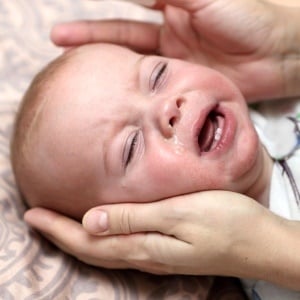
Is your baby's stuffy nose and cough just a cold or something more serious?
It could be respiratory syncytial virus (RSV), the leading cause of infant hospitalisation in the United States, experts say.
Not serious for most
Respiratory syncytial virus, or RSV, is a respiratory virus that infects the lungs and breathing passages. Healthy people typically experience mild, cold-like symptoms and recover in a week or two.
RSV causes symptoms similar to those of other viruses, including stuffy or runny nose, fever, coughing, sneezing, loss of appetite and irritability. For most little ones, RSV isn't serious.
But it is the most common cause of bronchiolitis and pneumonia in children under age one. Each year, more than 140 000 babies and young children in the United States are hospitalised because of RSV.
"By age two, 90 to 100% of children have had at least one infection caused by RSV," said Dr Octavio Ramilo, chief of the division of infectious diseases at Nationwide Children's Hospital in Columbus, Ohio.
According to the SAMJ, despite ongoing efforts since the 1960s to develop an RSV
vaccine, it has remained elusive.
Antibiotics don't kill the virus
Infants can be hit hard.
"Babies under three months of age are very prone to get sicker for two reasons: their lungs are very small and therefore unable to handle a lot of inflammation, and the white cells of their immune systems that protect against infections are not ready yet," Ramilo said in a hospital news release.
Those with a severe RSV infection may refuse their bottle, have trouble sleeping and breathe more rapidly than usual. Parents who suspect RSV should talk to their child's doctor and go to the emergency department.
Most children recover on their own in about a week, though a cough can linger, according to Dr Asuncion Mejias, principal investigator at Nationwide's Center for Vaccines and Immunity.
Wash your hands often
"However, for high-risk groups such as young infants, patients with conditions like chronic lung disease and congenital heart disease, and patients with compromised immune systems, RSV can become much more serious very quickly," Mejias added.
There is no vaccine for RSV and antibiotics do not kill the virus.
A cool mist vaporiser can help children breathe and youngsters older than six months should be given plenty of liquids such as water and fruit juice. Those who are younger should be breast- or bottle-fed small amounts more often, the hospital's website suggests.
To help prevent RSV, wash your hands often, don't share dishes and eating utensils, and disinfect hard surfaces. Doctors also suggest parents limit very young infants' exposure to people (even siblings), especially during winter, when RSV is more common.
Image credit: iStock




 Publications
Publications
 Partners
Partners














